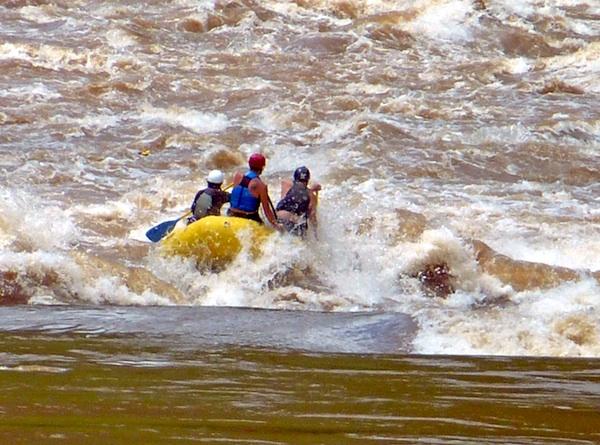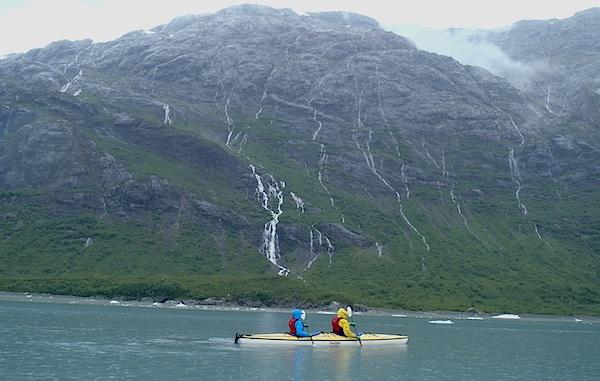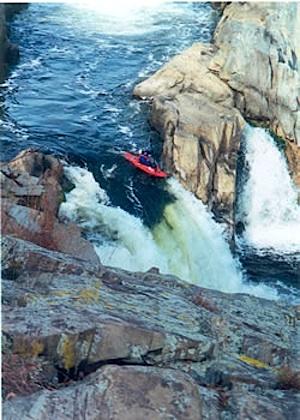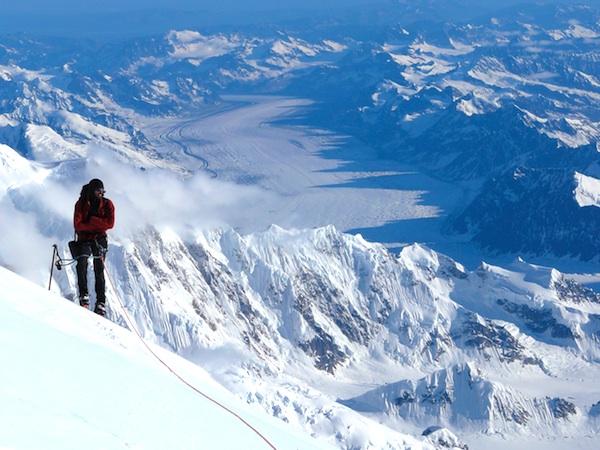
Are these people bored? Fayette Station Rapids, New River Gorge National River/NPS
Did you hear the news?
National parks, those wondrous and scenic expanses of Nature's eye candy, those wild and rumpled landscapes that test your skills and will kill you if you're not careful and prepared, or maybe just in the wrong place at the wrong time, are boring. They've been transformed -- or, perhaps, kept since their creation -- as "drive-through museums."
How did this happen with the National Park Service on watch for the past 98 years?
Apparently because the parks, the Western landscape parks, at least, are managed primarily to protect and preserve their landscapes, not as testing grounds for the latest recreational fad. They are, as Park Service Director Jon Jarvis told us back in March, losing their relevancy with the American public.
'There's a real relevancy problem with the parks,' Adam Cramer, the executive director of the Outdoor Alliance, told a writer from Outside Magazine. 'They're shutting off vectors like bikes and kayaks for people to have the kinds of meaningful experiences that are the genesis for a conservation ethic.'
Really?
Paddlers have been having "meaningful experiences" in the national parks for generations. In our Essential Guide To Paddling The Parks we list more than 90 units of the National Park System that welcome paddlers. They measure themselves (and have meaningful experiences) against the Colorado River through Grand Canyon National Park and Canyonlands National Park, down the Green and Yampa in Dinosaur National Monument, and against the Alaskan rivers that flow through Wrangell-St. Elias National Park and Preserve, Gates of the Arctic National Park and Preserve, and Noatak National Preserve, just to name some of the possibilities.

It takes a good deal of effort, and lust for adventure, to kayak the far end of Glacier Bay in its namesake national park/Kurt Repanshek
Sea kayakers tour the lakes of Yellowstone, Voyageurs, and Acadia national parks, lose themselves for days and even weeks in the waters of Glacier Bay National Park and Preserve, explore the sea-like waters of Lake Superior in Apostle Islands and Pictured Rocks national lakeshores, and venture out into the watery landscapes of Cape Lookout National Seashore, Everglades National Park, and even Glen Canyon National Recreation Area (Lake Powell). Do they go in search of boredom?

Kayaking the Potomac River at Great Falls Park. Boring? No. Crazy? Perhaps/NPS
White-water kayakers can choose from among the New River Gorge National River in West Virginia, the Gauley River National Recreation Area, also in West Virginia, Big South Fork River and Recreation Area in Tennessee, as well as the parks through which the Green and Colorado rivers run. There is no shortage of opportunities. There's even one in Washington, D.C.'s backyard, the Potomic River that roars through Great Falls Park.
Consider the climbing possibilities in places such as Denali National Park, Mount Rainier National Park, North Cascades National Park, Grand Teton National Park, Rocky Mountain National Park, and even on the cliffs of Acadia, and swallowing this "boring" concept gets tougher and tougher.
Really, the issue is not that the parks are "boring." Rather, the Outside article bemoans that they're not flung open to all recreational comers. But then, they weren't intended to be larger manifestations of your local city park.

This Denali climber doesn't look bored/NPS
There's not a "relevancy problem" with the national parks, at least not when it comes to outdoors recreation. If you're bored with the opportunities in the national parks, you're not realizing the possibilities.
Set off, as Andrew Skurka did in 2010, on a 4,679-mile circumnavigation of Alaska on skis, packable raft, and hiking boots, and you won't be bored. You'll be challenged to stay alive in one of the most glorious and demanding settings in North America. Hike the 2,650-mile Pacific Crest Trail as blind hiker Trevor Thomas did, or the 2,184-mile Appalachian National Scenic Trail as Jennifer Pharr Davis did in record-setting time, in one five- or six-month bite and you'll be transformed, physically as well as mentally. You'll likely reorder your life. Discover, as two cavers did in Carlsbad Caverns National Park last Halloween, the largest subterranean room found there in decades, and you won't stop talking about it for a good while.
Are those the types of folks who are being "ostracized," as Grayson Schaffer put it?
In his article in Outside, Mr. Schaffer would have us believe that we need professional bike races through places such as Colorado National Monument, marathons run through Death Valley National Park, and to be able to launch ourselves, cloaked in a wingsuit, off El Capitan at Yosemite National Park to appreciate, savor, and enjoy national parks. Does base-jumping, an inherently dangerous endeavor that has killed two in Zion National Park in Utah this year already, nurture a conservation ethic...or fuel an adrenalin kick, one with a high-risk downside?
How does any of that develop a conservation ethic? Such an ethic is achieved through soaking in the mountains, forests, rivers, lakes, and glaciers, appreciating them for their very existence, and seeking ways to conserve them.
The fallacy of Mr. Schaffer's argument can even be found elsewhere in Outside. In March 2012 the publication ran a story about "12 National Park Adventures Off the Beaten Path." It pointed to:
* river kayaking in Olympic National Park;
* pedaling over the Going-to-the-Sun Road in Glacier National Park and continuing on to Waterton Lakes National Park in Alberta, Canada;
* sea kayaking (with fresh lobster for dinner) at Acadia National Park;
* sea kayaking among the whales and icebergs in Glacier Bay National Park, (where you might share your camps with brown bears);
* climbing among the boulders and outcrops of Joshua Tree National Park;
* climbing to the 13,770-foot summit of the Grand Teton in its namesake park;
* hoisting a pack on your back and hiking for five days through Isle Royale National Park with hopes of catching a wolf's howl;
* or mountain biking in places such as Mammoth Cave National Park in Kentucky, Santa Monica Mountains National Recreation Area in California, Big South Fork River and Recreation Area in Tennessee, or New River Gorge National River in West Virginia.
And there was nary a mention of boredom or lack of opportunities.
That same year, Outside ran an article by Michael Lanza, an occasional contributor to the Traveler, on "The 10 Best National Park Adventures With Kids," and there were no mountain bikes or wingsuits necessary, (although hiking boots, sea kayaks, cross-country skis, and backpacks were).
Finally, we have to wonder what point Mr. Grayson was trying to make when he wrote:
The nonprofit Outdoor Alliance, a Washington, D.C., umbrella group for human-powered-advocacy organizations like American Whitewater, climbing's Access Fund, and the International Mountain Bicycling Association (IMBA), has 100,000 members and skews toward a Gen Y demographic. By comparison, the National Parks Conservation Association (NPCA), the historical champion of the national parks, has 500,000 members with a median age in the sixties.
Is he stereotyping older folks as sedentary folks? Surely that can't be the case, can it? I know and encounter plenty of folks in their sixties and older out enjoying the parks in active recreational pursuits. Indeed, one friend in her 70s rows her own raft down the Yampa and Green rivers through Class III and IV rapids in Dinosaur National Monument, and another still climbs mountains. There are other examples, but the point is that entering one's seventh decade doesn't automatically equate with avoiding the outdoors and retiring to the couch.
The national parks were meant for testing our physical skills, yes, but that basic skill still is walking. Hiking, climbing, cross-country skiing, and paddling are part of walking. Those activities say look at the wilderness, not look at me. Extreme sports are the epitome of 'look at me. Look what I can do!" Fine, put that in an arena, not in a national park. Give it an X Games channel. If Outside Magazine wishes to be Sports Illustrated, tell us now when we may expect the swimsuit issue. But don't call that loving the national parks.
Unfortunately, the blame lies chiefly with the National Park Service and its government narcissists, who, too, have lost their sense of history. As Peggy Noonan writes in The Wall Street Journal, government has simply 'gone too far.' Government has listened to everyone except the people it should be listening to, and sadly, that also goes for our national parks.



Comments
Zubulon, actually no nerve struck, because there are smart people in the parks that will utilize environmental assessments before ever approving an x-games ramp on the delicate arch. Hence, it will never happen and you will not win your argument.
And, the many cyclists I know are not ecologically minded. Most of them are clueless about the various plants they are crushing while filming how cool they are with a gopro while flying down a track so they can post it on facebook so their buddies can like it, and be like "dude, you crushed it bro.".
I"m not going to post any more documents on the impacts. I'm wasting my time with you. You're not going to be able to read those documents at a deeper level, and comprehend what they say. So it's pointless arguing with you any further. If you had a connection with the environment, you wouldn't mock me for trying to explain why it is important to recognize the natural resources in our natioinal parks. You obviously don't have a connection, beyond your own ego. We all eventually grow up out of that phase.
I see the flame war is well underway! Later, I'll try to respond in detail, in a way that doesn't make it worse.
For now, this one assertion caught my eye:
I'd have to file that in the category of famous last words.
Obviously, and fortunately, the NPS has exactly the opposite opinion, as would any bureaucracy subject to budgeting.
Gary,
Why can't you make an argument without exaggerating? X games on arches? And you want to be taken seriously? If you really cared about the environment, then you would go after the real culprits, like trains of mules and horses destroying trails, high meadows and crapping everywhere. Thanks for playing. That was fun.
For your edification, cycling and being environmentally sensitive are not mutually exlusive.
Barbara,
I thought you were a scientist, but then I see that you're actually quoting an article with Vandeman. LOL!!! The guy is a local nutter who has been convicted of assaulting cyclists. http://www.outsideonline.com/blog/outdoor-adventure/the-trial-of-mike-va...
MVD has been spending the last 20 years of his life on an quixotic crusade against cyclists of all stripes, taking usually great delight posting about single accident that occurs to anyone. Do you really want to be associated with that guy?
Well, folks, we're going to shut this one down for comments. I think the topic has been exhausted...so much, in fact, that folks are wandering off in other directions.
Please, let's try to keep the dialogue civil and constructive no matter what the issue is. We realize there are lines drawn in concrete in some of these issues, but disparaging folks does no one any good and keeps others who might contribute to the discussion from doing so.